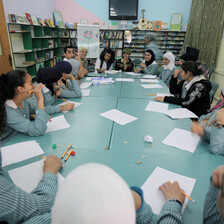The Electronic Intifada 26 August 2005
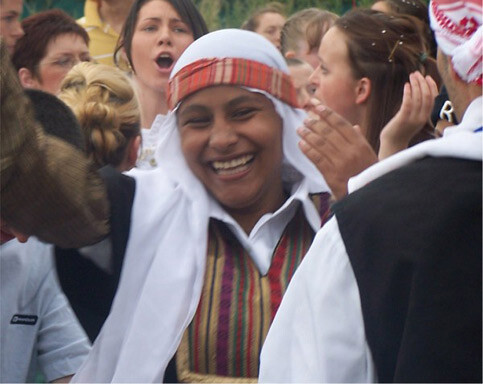
Yafa Cultural Centre on tour in the United Kingdom. (YCC)
My train arrives in Exeter at 6.45 pm and I phone my friend. “Come soon! The show begins in 15 minutes.” I jump in a taxi and 10 minutes later arrive at the John Stocker School, where a friendly smile and handshake welcomes over 200 guests (three times more than they expected). My friend had already told me, “This show is impossible to see with dry eyes.” He is correct.
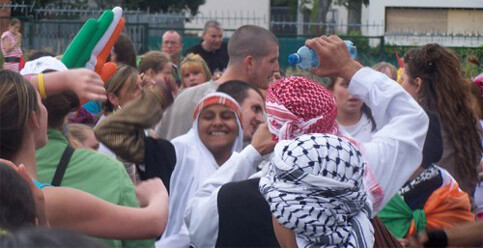
To download the video, click here [MPEG format, 9.4MB] — the 30 seconds video was made by Jeff Handmaker.
The first international tour of the Balata Youth Drama and Dance Group travelled to the United Kingdom in August 2005. The Group are a project of the Yafa Cultural Centre (YCC), which is based in Balata Refugee Camp in Nablus. This was Balata’s ‘A’edoon tour - “we will return”.
Member of the Group held in detention
The tour got off to a difficult start. One child in the Group, 16-year old Mohamed, was arrested by the Israeli Occupying Force on the 25th of July as the group crossed the border from Palestine into Jordan. One-month later, Mohamed continued to be held in administrative detention, being interrogated without charge and without access to a legal representative or his family.
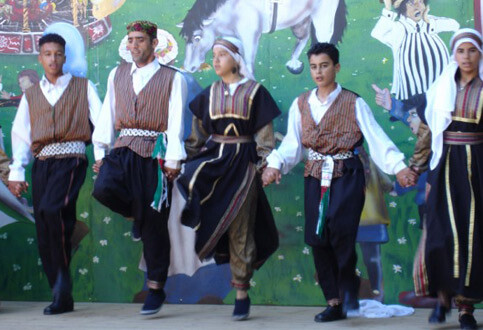
YCC in Devon Leisure Park. (YCC)
Meditative Tale
The show is in three parts, a 40 minute drama, followed by a 15 minute music and song and then a 20 minute dance performance.
A’edoon is a highly visual theatre piece with few spoken words. The drama is a meditative tale. It tells the almost universal story of displacement, dispossession, oppression and finally dignity and hope.
An accompanying programme offers some helpful explanation, but this is hardly necessary for those familiar with the forced displacement of Palestinians. The performance of these children is electrifying.
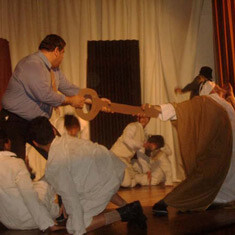
Photo: YCC
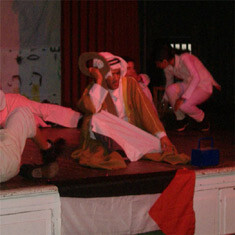
Photo: YCC
The show traces the history of displacement, from the time when Palestinians lived peacefully in their villages, to attacks by Israeli soldiers causing them to flee their villages, difficulties living in a refugee camp with inadequate sanitation and the poor quality of schools, the subsequent Israeli occupation and then later the struggle against the occupation.
At one point in the performance, there is a haunting cry of grief, mourning the loss of family killed by Israeli occupation forces and of land dispossessed by soldiers for the exclusive benefit of Israeli families.
Another moving scene shows an elder, symbolically holding a giant key. Soldiers and others try to take the key away, even by trying to saw off his arms, but all efforts fail. The desire to return remains as strong as ever.
The strong visual images are accompanied by powerful, original music produced by Yafa Cultural Centre musicians, which weaves the traditional and the modern.
The theatre concludes with a message of dignity of resistance to military occupation. “Stop running and stand up for yourselves! - says the voice of Ahmed, declaring he is everywhere and in everybody, resisting (the occupation) and demanding their rights.”
Song and Dance
The theatre performance is followed by Palestinian songs, sung by the children, accompanied by YCC’s highly accomplished musical director who plays (amongst many other instruments) a traditional “Oud”.
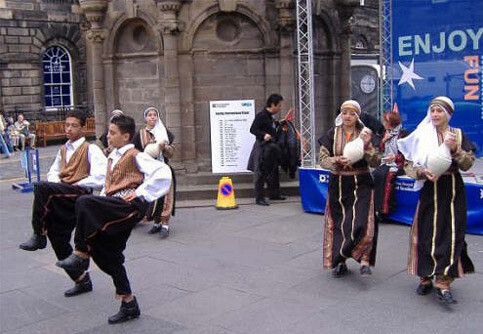
Dance performance at Edinburgh Fringe Festival. (YCC)
Finally, there is a powerful dance performance by the youth performers, traditional dancing accompanied by Palestinian music.
Help from local solidarity groups
While YCC organised the programme and the tour, they were helped by large number of local activists in Northern Ireland (Derry and Belfast), Scotland (Glasgow, Edinburgh and Dundee), Wales (Swansea) and England (Exeter and London). Many of these were former anti-apartheid activists, well-experienced in organising solidarity activities.
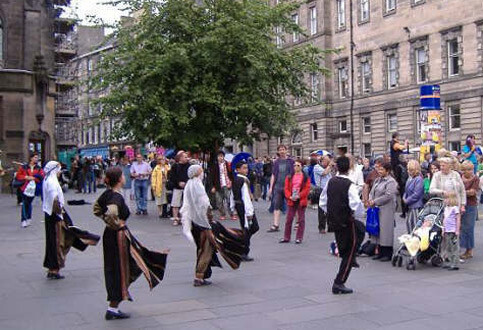
A fringe show of the YCC in Edinburgh. (YCC)
One of these groups was Exeter Palestine Solidarity Campaign, which organised the venues for performances in Devon, local transport, places to sleep with fellow activists, packed lunches for the children and - important for these weary performers - entertainment for the children.
Being the first overseas tour for YCC theatre group, it proved without doubt a huge success for the young artists and their talented directors. In Exeter, people were visibly moved by the message and entertained by the professionalism of the Balata group.
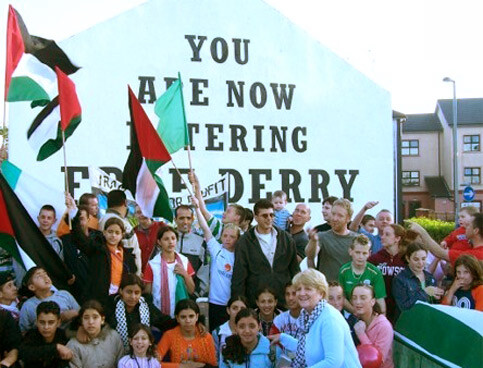
YCC in Derry. (YCC)
YCC were also moved by the solidarity expressed by many activists throughout the United Kingdom - in Northern Ireland, in particular, which has seen its own long, resistance struggle against (British) occupation. Of these activists in particular, YCC’s director said: “The Irish were more ‘Palestinian’ than we were!”
Jeff Handmaker is a lawyer and human rights advocate based in the Netherlands.
Related Links



